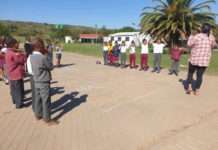A CASE STUDY
STEPS CHARITY NPC was established in 2005 as the only non-profit in South Africa focused on clubfoot support. Their innovative approach and theory of change model has seen them win numerous awards such as the SAB Foundation Social Innovation Awards. Recently, a Clinic Co-ordination training webinar series was, for the first time, opened to a global audience; with the locations of the attendees showcasing that, although the content and model have been developed in South Africa, global interest in their supportive clubfoot treatment model is high.
38 Countries were represented within the 400 registrations received. Attendees came from South Africa, another 19 African countries, and from Chile, Brazil, India, Bangladesh, Iraq and other developing countries. 60% of those who registered participated live, with the balance choosing to watch the recording later.
“South African clubfoot clinics in the state sector offer world class treatment for all patients, overseen by orthopaedic surgeons who simultaneously train new medical students to ensure the knowledge is sustainable,” says STEPS’ Executive director and founder, Karen Moss. “STEPS creates effective solutions that are cost-saving for their South African clinic partners and we willingly share them with other providers globally.”
STEPS launched their clinic support programme in 2013 to bridge the gaps in under resourced state clinics. Focused on patient-centred support, STEPS Clubfoot Care supports 38 partner clinics in South Africa in the state health sector to provide the non-invasive Ponseti method of clubfoot treatment; the global gold standard treatment that has been welcomed and supported by paediatric orthopaedic surgeons and other orthopaedic health professionals.
“The Ponseti method of treatment changed the landscape of clubfoot treatment to a more effective treatment far better suited to low-resource settings,” says Moss.
Based on their Clubfoot Clinic Co-ordination model, the STEPS clinic support programme provides information and resources, and trains support staff for clinics in ‘non’ medical areas such as parent education and data capture whilst also providing support materials such as educational leaflets and medical devices.
“In 2019, we had 20 attendees from around South Africa in our first Clinic Co-ordinator in-person training,” says Moss. “In 2020 the training was cancelled because of the pandemic and with no end of that in sight, we turned to virtual training. Although developed for our partners in the South African Steps Clubfoot Care clinic support programme, STEPS – as a member of the Global Clubfoot Initiative, was able to open the webinar to a global audience for the first time. Thanks to generous sponsors, the webinar was offered to attendees at no cost.”
“A common problem in state is limited staff for administration and patient-parent support as well as efficient data capture tools,” says Moss. “The webinar series focused on clubfoot clinic coordination which is based on processes and resources developed by STEPS and which showcases partnerships between a support organisation and clinics.”
There were 23 polls run during the 3-part webinar series and 94% confirmed interest in attending future webinars. “A big advantage of a webinar in the health sector is that it is far less time consuming for health care professionals who are already working insane hours and dealing with enormous health stress. There is no need to travel, and one day’s training was able to be condensed into three parts over three weeks,” says Moss. “This meant that they could either participate live or watch the recording later. STEPS applied for CPD points which were awarded to all South African health professionals who attended the three days, or those who watched online and then completed a knowledge assessment form.” Steps Charity Worldwide, a STEPS partner based in the UK also got CPD points approval for four hours of training, the equivalent of 4 CPD points. This is a notable achievement by STEPS, and an international acknowledgement of the quality of their webinar training content.
100% of the attendees agreed that effective clinic coordination is important for successful clubfoot treatment, 99% agreed that parent and caregiver emotional support is important, 91% agreed that the main benefit of good parent education is increased adherence to treatment and 94% said that Clubfoot is still stigmatised and needs more awareness.
“The poll results strongly support the work that STEPS is doing,” says Moss. “This level of recognition that a partnership model not only works but, ensures sustainability, is an incredible acknowledgement of what we have put into place. 70% also said that they have either no supply or inconsistent supply of effective clubfoot braces. This is a worldwide challenge and STEPS has focused on sourcing and distributing clubfoot braces to South and East Africa as a social enterprise.”
STEPS works in partnership with the South African Paediatric Orthopaedic Society to expand clubfoot treatment. Their Ponseti for Parents© parent education leaflets and parent adviser manual has been translated into several languages and is used globally and referred to patients by doctors.
“It’s all about collaboration and grass-roots relationships,” says Moss. “None of us could do it alone and South Africa is a shining example of the power of partnerships.” The STEPS theory of change model is replicable and scalable for other UMIC whether in Africa, Europe or South America.
Steps is hosting the inaugural Clubfoot Africa Conference in 2022, which will be a hybrid conference in 2022. The date to be announced at the next series of Clubfoot Africa Education webinars which will focus on specialist aspects of clubfoot treatment. Website: https://clubfootafrica.com/












